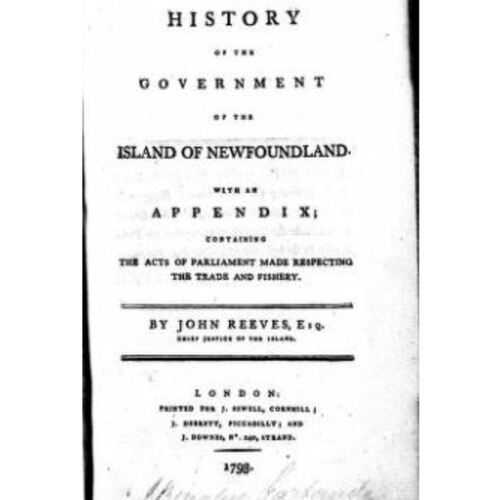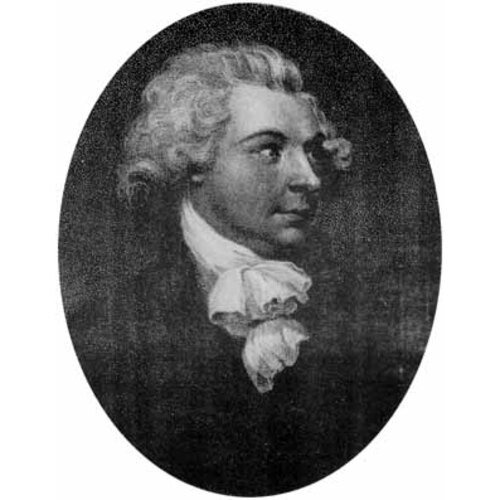
Source: Link
REEVES, JOHN, judge and author; b. 20 Nov. 1752 in London, son of John Reeves; d. there unmarried 7 Aug. 1829.
Schooled at Eton College, John Reeves was denied a fellowship at King’s College, Cambridge, but matriculated at Merton College, Oxford, on 31 Oct. 1771. He obtained his ba in 1775 and on 11 November was elected Michel scholar of Queen’s College, Oxford. He became a fellow of Queen’s on 8 Oct. 1777, qualifying for an ma the next year. In 1780 Reeves was made a commissioner of bankrupts, having been called to the bar via the Middle Temple the previous year. In 1779 too he had begun his career as a prolific author of works on legal, political, and constitutional questions. Legal adviser to the Privy Council committee for trade from 1787, he was elected a fellow of the Royal Society three years later.
In 1791 Reeves stepped out of the conventional life of his profession when he became a judge in Newfoundland. The circumstances of his nomination were complex. In 1787 a decision of the Court of Quarter Sessions in Devon, England, had challenged the legality of the system of civil justice on the island [see Richard Hutchings*]. As a result, prospective litigants were unable to obtain hearings on the island, a difficulty compounded by a severe set-back in the fishery late that year. In 1789 Governor Mark Milbanke* established a court of common pleas, but his authority to do so was denied by the English law officers. Finally, in 1791 remedial legislation was passed by parliament. The act 31 Geo.III, c.29, created “a court of civil jurisdiction” to determine “all pleas of debt, account, contracts respecting personal property, and all trespasses committed against the person or goods and chattels” in Newfoundland “and islands and parts adjacent, or on the banks” off Newfoundland. The court was to consist of a “chief judge,” appointed by the king, and two assessors, appointed by the governor. During the governor’s residence it would also have exclusive jurisdiction in disputes about the wages of seamen or fishermen. In the governor’s absence such disputes could be heard, as before, in the court of session mentioned in 15 Geo.III, c.31. The act was to take effect on 10 June 1791 and continue for one year, “and unto the end of the then next session of Parliament.”
Reeves arrived in Newfoundland as chief judge on 10 Sept. 1791. The assessors were Aaron Graham*, secretary to successive governors, and D’Ewes Coke, the controller of customs. Between then and 31 October, 138 writs were issued. Reeves left for home on 1 November, and reports on his work went to Henry Dundas, the home secretary, and the Privy Council committee for trade. Noting that the influence of the court had been confined to the St John’s area, Reeves proposed several reforms, the most important of which was the establishment of a permanent supreme court with both civil and criminal jurisdiction. The existing courts of session would work in concert with this new court by trying petty offences, “especially those arising from disputes over wages.” Reeves also called for the granting of legal status to the courts held in the outports by naval officers.
An act incorporating these suggestions received royal assent on 15 June 1792, despite vigorous opposition from West Country interests. By its terms a supreme court with full authority in all civil and criminal cases was to be established. In criminal matters the court was to follow English law, and in civil cases English law “as far as the same can be applied to suits and complaints” arising in Newfoundland. Presiding over the court would be a chief justice, appointed by the king, with officers appointed by the chief justice. The act also empowered the governor, with the advice of the chief justice, to institute civil courts called surrogate courts in different parts of the island as required. These were also to determine cases according to English law. In civil cases in both courts defendants could claim trial by jury if “the cause of action” exceeded £10. Judgements by the surrogate courts for sums exceeding £40 could be appealed to the Supreme Court, those by the Supreme Court for sums exceeding £100 to the king in council. The court of civil jurisdiction established in 1791 was to function until the opening of the new court, which would have the same life as its predecessor.
Reeves returned to Newfoundland as chief justice on 3 Sept. 1792. Besides holding court in St John’s, he “made a Circuit round to Conception Bay and Trinity Bay” and visited Ferryland. His staff consisted of a single clerk, but he had the “voluntary Assistance” of Coke. By 30 October, when he left for home, he had issued 120 writs. While in Newfoundland Reeves recommended to Dundas that a system of justice like that created by the 1792 act be made permanent, and on his return to England he devoted himself wholeheartedly to this cause. In February 1793 he was given a public forum for his views when the House of Commons appointed a committee to inquire into the state of the trade to Newfoundland.
On appearing before the committee, Reeves was permitted to read a paper which examined both the history and the existing state of Newfoundland. In particular, he was concerned to rebut the evidence of Peter Ougier* and William Newman, Devon merchants opposed to the judicial changes. Reeves attributed their attitude and that of their supporters in the West Country to the disreputable activities of merchants’ agents in Newfoundland, who would resist the administration of justice in order “to draw as few Bills” as possible on their principals. “A certain Class” of West Country merchants had “invariably set themselves against every Attempt to introduce Order and Justice” to Newfoundland, looking upon the island as their own property. Their purpose had been “to secure their private Interests . . . independent of any Competition from other Traders, and of any Inspection.” Their policy had been embodied in slogans such as “No Residents” and “A free Fishery carried on from Great Britain,” but the freedom they had sought was that “of being free of all Rule and Order themselves, in the Enjoyment of an exclusive Monopoly, and at Liberty to exercise a Dominion over the Boatkeepers and poor Inhabitants, whom they kept in perpetual Thraldom.” Reeves strongly recommended the continuance of the court system, and argued that it could be improved by the establishment of a court to function in the absence of the chief justice and surrogates for the recovery of debts and for the determination of any sort of cause. The personnel of this court, from which there should be right of appeal to the Supreme Court, night be “no other than the very Persons who sat in the Court of Common Pleas.” Newfoundland needed “the Control and the Protection of Magistracy and Officers, like the rest of the King’s Dominions,” in short “something more of a resident Government.”
Reeves also commented on the nature of landholding in Newfoundland, noting that the ownership of “Three Fourths of the Ground . . . used and possessed in the Island” could not be traced to any “Grant or . . . Thing to shew for the original Possession.” Title by occupancy alone was especially the case in the outports, “where being removed from the Eye of Government, they make Inclosures, and carve for themselves almost as they please.” He recommended that the crown should receive from landholders “some Acknowledgment by way of Quit Rent.”
His judicial advice at least was sympathetically heard, for on 17 June 1793 royal assent was given to an act which continued the system he had inaugurated. Reeves’s successor as chief justice was D’Ewes Coke.
In April 1793 Reeves completed his famous History of the government of the island of Newfoundland, the first comprehensive account of the island’s past. In keeping with his own experience, he focused on “the struggles and vicissitudes of two contending interests. – The planters and inhabitants on the one hand, who, being settled there, needed the protection of a government and police, with the administration of justice: and the adventurers and merchants on the other; who, originally carrying on the fishery from this country, and visiting that island only for the season, needed no such protection for themselves, and had various reasons for preventing its being afforded to the others.” The dialectic thus posed was to be examined over and over again in the historiography of Newfoundland. In 1978 Keith Matthews argued that Reeves’s work, the “first published identification of the West Country merchants with villainy,” had “been read and broadly accepted by every recent historian.”
On 22 March 1794 Dundas recommended to the Treasury that Reeves be paid £500 for each period of his service in Newfoundland. In 1795 the ultra-royalist Reeves published anonymously in London a pamphlet entitled Thoughts on the English government; addressed to the quiet good sense of the people of England; in a series of letters; letter the first. This work exaggerated the power of the monarch in the constitution at the expense of parliament and juries. He was charged with libel on this account – an unusual fate for a conservative spokesman – but was acquitted the following year. In 1800 Reeves was appointed king’s printer and in 1824 elected a bencher of the Inns of Court. He died a wealthy bachelor and was buried in the Temple Church (St Mary’s) on 17 Aug. 1829.
John Reeves is the author of History of the government of the island of Newfoundland . . . (London, 1793; repr. New York and East Ardsley, Eng., 1967).
G.B., Parl., House of Commons, Journals (London), 46 (1790–91)–48 (1792–93); House of Commons papers, 1793, no. 4393, First report from the committee appointed to enquire into the state of trade to Newfoundland; no.4407, Second report . . . ; no.4438, Third report. . . . DNB. The Eton College register, 1753–1790, ed. R. A. Austen-Leigh (Eton, Eng., 1921). C. R. Fay, Life and labour in Newfoundland (Toronto, 1956). A. H. McLintock, The establishment of constitutional government in Newfoundland, 1783–1832: a study of retarded colonisation (London and Toronto, 1941). Keith Matthews, Lectures on the history of Newfoundland: 1500–1830 (St John’s, 1973). Prowse, Hist. of Nfld. (1895). Keith Matthews, “Historical fence building: a critique of the historiography of Newfoundland,” Newfoundland Quarterly (St John’s), 74 (1978–79), no.1: 21–30.
Cite This Article
Peter Neary, “REEVES, JOHN,” in Dictionary of Canadian Biography, vol. 6, University of Toronto/Université Laval, 2003–, accessed June 1, 2025, https://www.biographi.ca/en/bio/reeves_john_6E.html.
The citation above shows the format for footnotes and endnotes according to the Chicago manual of style (16th edition). Information to be used in other citation formats:
| Permalink: | https://www.biographi.ca/en/bio/reeves_john_6E.html |
| Author of Article: | Peter Neary |
| Title of Article: | REEVES, JOHN |
| Publication Name: | Dictionary of Canadian Biography, vol. 6 |
| Publisher: | University of Toronto/Université Laval |
| Year of revision: | 1987 |
| Access Date: | June 1, 2025 |




